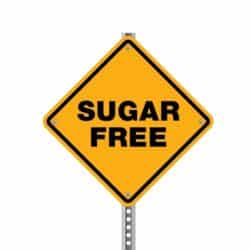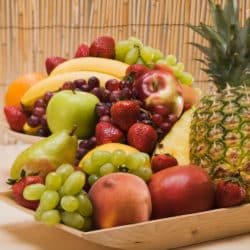10 Natural Sugar Substitutes for a Clean Eating Diet
Learn 10 natural sugar substitutes to choose when you are watching your sugar intake, as well as the benefits and drawbacks of each one. This list includes caloric and non-caloric options that are appropriate for low-carb dieters, plus anyone wanting alternatives to cane sugar.

Why Reduce Sugar Intake?
It’s no secret that Americans consume a lot of sugar. Americans eat about 25 teaspoons a day of added sugars.
The American Heart Association recommends no more than 6 teaspoons of added sugar for women and 9 teaspoons of added sugar for men.
There are drawbacks to excessive sugar consumption including inflammation, heart disease, weight gain, insulin resistance, blood sugar dysregulation, and hormonal issues. Sugar is also a simple carbohydrate, which makes it unsuitable for those with diabetes or those on a low-sugar diet.
It’s likely that most people can stand to reduce their sugar intake, either by abstinence or by switching to sugar substitutes. Anyone with diabetes, blood sugar problems, hormonal issues, inflammation-based illnesses, mental health conditions, and hypertension may especially wish to replace sugar with sugar substitutes.
Learn more about the health benefits of a sugar-free diet.
Of course, it’s best to check with your doctor or healthcare provider to determine if you need to cut back on sugar or cut it out completely.
What are Natural Sugar Substitutes?
A sugar substitute is a substitution for sugar that offers a sweet taste with less of the inflammatory, empty calories of sugar. There are two main types of sweeteners: those that contain natural sugars (nutritive sweeteners), such as honey, and those that contain no sugar (non-nutritive), such as stevia.
In this list of the best sugar substitutes, you’ll find options for both sugar-free and less sugar alternatives. You’ll also find suggestions for which sweeteners are best for certain types of diets.
Learn more about natural sugars vs. added sugars.
These sugar substitutes are listed in no particular order. Let’s begin!
10 Sugar Substitutes
1. Erythritol
Erythritol is a zero calorie sweetener that is actually a natural sugar alcohol with zero calories. It is suitable for those with diabetes, blood sugar issues, and keto dieters because it provides no calories and does not raise blood sugar.
Be sure to purchase organic versions of erythritol, as it is commonly made from GMO corn. It’s also been shown to cause gastrointestinal issues in some people, so be aware if you are new to using erythritol (start with a teeny amount to make sure it works for you).
2023 Update: Also, it is important to be aware that a study released in 2023 showed a “higher risk of cardiovascular event risk” in people consuming erythritol. For this reason, it may be wise to reduce or eliminate consumption of erythritol as a sugar replacement until further research is performed.
2. Monk Fruit
This sugar substitute is ideal for those with diabetes, blood sugar issues, and keto dieters, as it’s low in calories and contains no sugar.
Monk fruit is derived from an actual fruit found in China and is much sweeter than sugar; thus, you need less of it to achieve a sweet taste. It is also known as Lo Han Guo and will not affect blood glucose levels.
The potential drawback of monk fruit sweetener, however, as it may leave an aftertaste or overly sweeten foods.
Monk fruit extract is my favorite non-nutritive sweetener and the only one that doesn’t have any weird side effects for me. I consider it to be the best tasting of the natural sweeteners. But, everyone is different, so you’ll have to try it for yourself!
Try monk fruit in hot beverages like my Chocolate Mint Tea.
Recommended monk fruit brand:
3. Stevia
Stevia is naturally derived from the stevia plant. Keep in mind, though, that much of the stevia on the market is actually processed and sometimes mixed with sugar alcohols. Stevia contains no sugar and won’t raise blood sugar levels, so it’s suitable for keto dieters and diabetics.
If you want to try stevia, opt for organic stevia that is as unrefined as possible. Look for this zero-calorie sweetener in the baking aisle of your local grocery store.
Stevia is about 200-400 times sweeter than sugar, so be careful when substituting. It may cause cravings and leave a bitter aftertaste due to its increased sweetness. I personally do not like stevia, but my husband does in his butter coffee.
Recommended stevia brand:
4. Xylitol
Xylitol is another processed sugar alcohol that won’t raise blood sugar levels, making it suitable for keto dieters and diabetics. Like other sugar alcohols, xylitol may cause digestive distress in some individuals.
It also is commonly derived from GMO corn, so opt for an organic version (made from birchwood if you’re on a grain-free diet).
Bonus: xylitol has some evidence that it can be beneficial for oral health and even act as a prebiotic! This means that xylitol may be good for your overall health and digestive tract. I consider it a good option if you have a sweet tooth.
Recommended xylitol brand:
5. Raw Honey
Raw honey is a whole food rich in vitamins, amino acids, and antioxidants. It’s likely better for you than cane sugar as it is unrefined and contains nutrients.
Raw honey won’t raise your blood sugar as quickly as refined sugar or table sugar will. However, it does contain a significant amount of calories and carbohydrates in the form of glucose. This means it is in the category of a nutritive sweetener.
Individuals with diabetes should be aware that raw honey will still raise blood sugar levels and insulin levels, albeit more slowly than processed sugar. Keep in mind that honey has other benefits for diabetic patients, so it might not be unhealthy in small quantities.
I like using honey in my Honey Mustard Salad Dressing or just eaten by the teaspoon as a sweet treat every once in awhile.
Be sure to check with your healthcare provider to make sure raw honey is appropriate for you. And, it should be noted that honey should not be given to infants under the age of one.
Recommended raw honey brand:
6. Yacon Syrup
This is another whole food with a sweet taste. Yacon syrup is derived from a sweet-tasting root vegetable native to South America and can be used in place of any other liquid sweetener.
This syrup is a low-sugar, low-glycemic sugar substitute suitable for those with diabetes or on a ketogenic diet. It also contains nutrients and is an excellent prebiotic. This can mean, however, that it may cause digestive distress in large quantities or for those with any gut dysbiosis.
So, start with just a small amount if you want to try this natural sweetener.
Recommended Yacon syrup brand:
7. Dates, Date Sugar or Date Syrup
Dates and their derivatives have a naturally sweet taste. Although dates contain sugar and carbohydrates, they boast an impressive nutrient profile. Dates are especially high in fiber, so your blood sugar won’t spike as quickly as it would with refined sugar.
Due to the fiber content, the net carbohydrates in dates may be suitable for keto dieters depending on unique carbohydrate goals. Those with diabetes should stick to smaller servings, due to the higher carbohydrate and sugar content.
I use dates to sweeten a lot of my healthy dessert recipes. I use dates in my recipes for Avocado Chocolate Pudding and my Date Nut Bread.
Recommended date syrup brand:
8. Blackstrap Molasses
Molasses is a byproduct of sugarcane, but the extraction and production process renders it higher in nutrients. Blackstrap molasses also has an especially impressive nutrient profile but does have a significant amount of calories, carbohydrates, and sugar per serving (similar to raw honey.)
Blackstrap molasses is in the middle of the glycemic index, so it’s not as troublesome as refined sugar for diabetics, but will still raise blood sugar. Those on a low-carb diet may want to avoid molasses.
Recommended molasses brand:
9. Fruit Purees
Fruit purees are another whole food sugar substitute which is especially good for baking. These are fruits such as bananas, berries, stone fruits, or apples that are mashed into a puree, suitable for baking or for topping oatmeal, pancakes, etc.
I often use sweet potato puree, mashed ripe bananas, or applesauce to help sweeten my desserts, and the moisture often means I can cut back on the oils as well.
Fruit purees aren’t really a 1:1 replacement for other sweeteners, but still lend a sweet taste to baked goods. See my recipe for Banana Oatmeal Cookies.
The fiber content in fruit purees makes them a better choice for diabetics. Berry fruit purees may be suitable for low-carb dieters, but fruit purees with higher sugar/carbohydrate contents may not fit dietary guidelines.
You can buy unsweetened applesauce or make your own fruit purees for using in baked goods or to sweeten foods like oatmeal.
10. Maple Syrup or Coconut Sugar
Maple syrup is a pure sugar from the sap of maple trees, while coconut sugar is dehydrated coconut sap. Both maple syrup and coconut sugar are whole food sweeteners with vitamins, minerals, and antioxidants.
Coconut sugar can be used as a 1:1 replacement with processed sugar but it contains more fiber and nutrients. Maple syrup is high in vitamins and antioxidants.
Both maple syrup and coconut sugar contain a significant amount of calories, carbohydrates, and sugar, so low-carb dieters and diabetics may want to be careful with these options.
You may also want to check out my list of the Best Substitutes for Coconut Sugar.
Recommended maple syrup and coconut sugar brands:
Bonus Sugar Substitute: Allulose
Allulose is a sugar substitute that has been gaining popularity in the food industry because it has some unique properties that set it apart from other sugars. It’s a natural sugar that is found in small amounts in fruits and vegetables, including figs and raisins.
Allulose is 70% as sweet as regular sugar, doesn’t cause blood sugar spikes, and doesn’t contribute to tooth decay. Additionally, allulose does not have any of the unpleasant aftertastes associated with other “natural” sweeteners like stevia.
Recommended allulose brand:
FAQs
Depending on your specific health needs, you may choose to avoid different types of sugar substitutes. Those with diabetes may wish to avoid sweeteners containing sugar and instead stick with non-caloric sweeteners including monk fruit, stevia, erythritol, and xylitol.
If you have issues with gut health, you may want to avoid sugar alcohols.
Many people also wish to avoid artificial sweeteners due to health concerns.
And, now, based on research published in 2023, it may be important to avoid erythritol for individuals concerned about cardiovascular event risks.
In general, avoid relying upon overly processed sugar substitutes and reach for whole food sources of sweetness.
Non-caloric sweeteners typically won’t raise your blood sugar. These include monk fruit, stevia, and sugar alcohols like erythritol and xylitol.
However, in some particularly sensitive individuals, non-caloric sweeteners may still prompt an insulin response as the body anticipates calories from the sweet taste.
It is best to eat anything sweet in moderation, keeping both caloric sweeteners and non-caloric sweeteners as occasional treats.
Some find that non-caloric sugar substitutes have a bitter aftertaste; stevia, especially, is known for its aftertaste. Non-caloric sugar substitutes are also often much sweeter than actual sugar, making them hyper-palatable foods that you can become reliant upon. Sugar alcohols like erythritol and xylitol can cause digestive distress for sensitive individuals.
There is also evidence that the sugar substitute erythritol may be linked with cardiovascular event risk.
Caloric sugar substitutes like honey or blackstrap molasses can raise your blood sugar, which has an array of side effects, especially for those with diabetes or blood sugar regulation issues.
It depends on your preference between nutritive and non-nutritive sweeteners. You can try stevia, monk fruit, or xylitol depending on your preference.
More Sugar-Free Resources You Might Like
I’ve been writing about sugar-free diets for a few years now. Here are some other related articles that you might like.
- No Sugar Foods
- How To Do a Sugar Detox
- How to Go Sugar-Free
- No Sugar Diet Meal Plan
- Sugar-Free Diet Benefits
See my index of sugar-free recipes and consider joining my Sugar Free Challenge!
Don’t Miss These Sugar-Free Articles
Conclusions
There are so many great options for sugar substitutes now. Based on your specific needs, you might want to experiment with different options and see which works best for you.
Almost everyone would benefit from cutting back on refined sugars. Rather than using sugar substitutes, it might make sense to go completely sugar free. Be sure to check with your doctor if you have questions about what would be best for you.
Join my Monthly Sugar Free Challenge or check out my other Sugar Free Articles & Recipes!
Don’t forget to join my newsletter list to get exclusive clean eating recipes and tips. The newsletter is 100% free with no spam; unsubscribe anytime.
About the Author: Carrie Forrest has a master’s degree in public health with a specialty in nutrition and is studying to be a holistic nutritionist. She is a top wellness and food blogger with over 5 million annual visitors to her site. Carrie has an incredible story of recovery from chronic illness and is passionate about helping other women transform their health. Send her a message through her contact form.
Note: this post is for informational purposes only and is not intended as medical advice. Please consult your healthcare provider for recommendations related to your individual situation.






















Great tips. I would like to add; Please be aware Xyiltol is fatal to dogs.
Thanks for your informative E mails. I always learn something that will benefit my health.
is sugar cane sirup good or bad sirup for diabetes ?
Sugar cane syrup is likely not appropriate for diabetics.
I love that you put this list together. I need to cut back on sugar. I’ve been using maple syrup.
Thank you for posting this list. Being a diabetic, it is very helpful to me!
I have been using erythritol in various forms – with monkfruit, stevia, and plain. What I have noticed over the period of 3-4 months of using this exclusively is that I have, over time, developed gastro distress. I have had to stop using it except in very small amounts and not on a daily basis.
I have also grown my own stevia and powdered the leaves after drying them. I find that they don’t leave the same after taste that processed stevia does. But, using this in drinks is a little off-putting in that there is definitely a different “look” to the drink because of the green “floaties”!! In baked or other treats, it doesn’t have any effect! Can we say green brownies without the THC!!
I have decided that I will likely use just plain old white and brown cane sugar when I make treats as this doesn’t bother my stomach or intestines. Limiting cane sugar will be a big challenge, however.
Thanks for sharing that, Leanne! Have you tried Monk Fruit? It the only one of the non-nutritive ones that doesn’t both my stomach. I can’t do any of the sugar alcohols either. And, thanks for the laugh about the green brownies, ha ha.